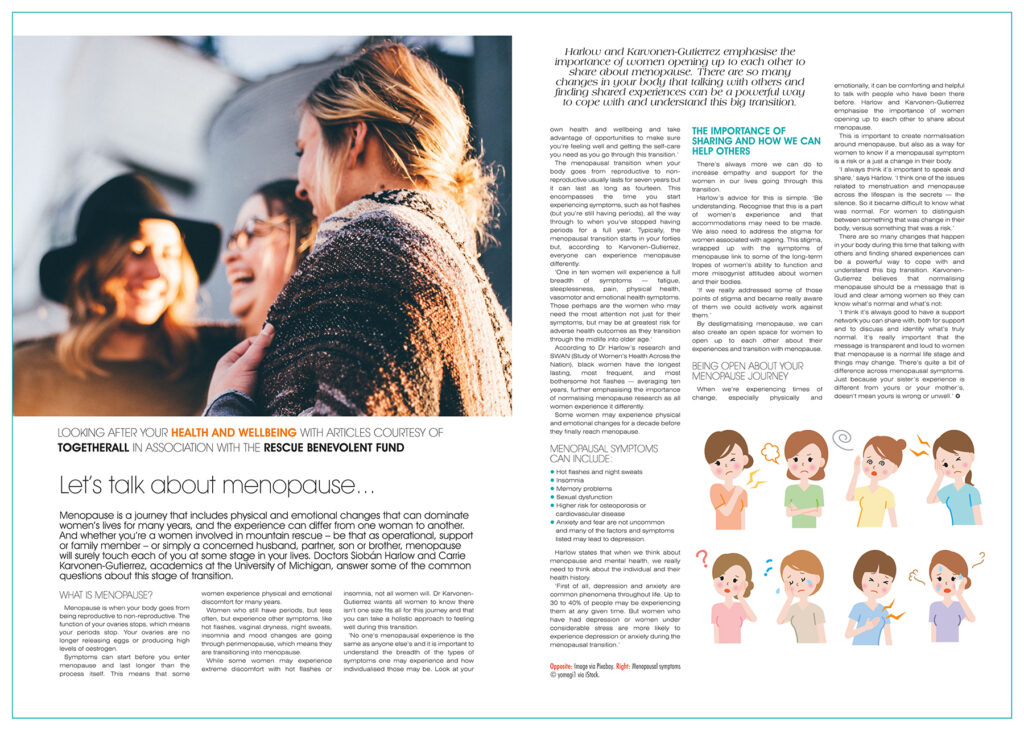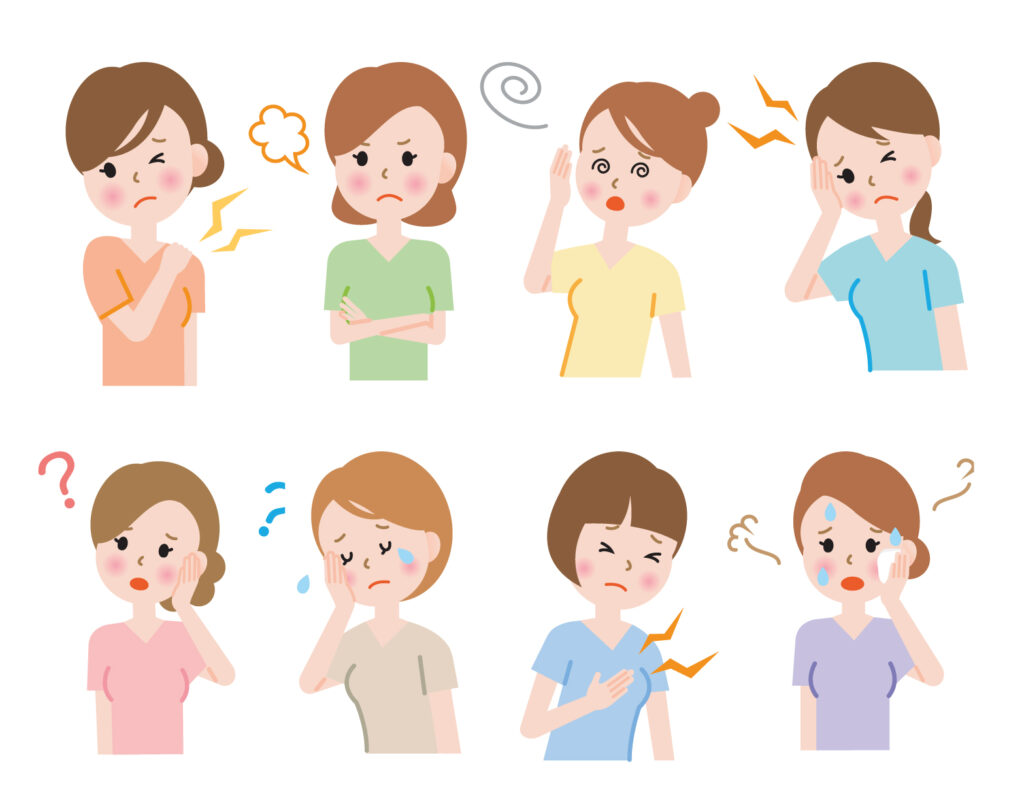Let’s talk about menopause…
Menopause is a journey that includes physical and emotional changes that can dominate women’s lives for many years, and the experience can differ from one woman to another.
From the archive: Mountain Rescue Magazine Issue 85, Summer 2023. Courtesy of Togetherall, Doctors Siobán Harlow and Carrie Karvonen-Gutierrez, of the University of Michigan, answer some of the common questions about this stage of transition.

Menopause is a journey that includes physical and emotional changes that can dominate women’s lives for many years, and the experience can differ from one woman to another. And whether you’re a women involved in mountain rescue — be that as operational, support or family member — or simply a concerned husband, partner, son or brother, menopause will surely touch each of you at some stage in your lives.
What is menopause?
Menopause is when your body goes from being reproductive to non-reproductive. The function of your ovaries stops, which means your periods stop. Your ovaries are no longer releasing eggs or producing high levels of oestrogen.
Symptoms can start before you enter menopause and last longer than the process itself. This means that some women experience physical and emotional discomfort for many years.
Women who still have periods, but less often, but experience other symptoms, like hot flashes, vaginal dryness, night sweats, insomnia and mood changes are going through perimenopause, which means they are transitioning into menopause.
While some women may experience extreme discomfort with hot flashes or insomnia, not all women will. Dr Karvonen-Gutierrez wants all women to know there isn’t one size fits all for this journey and that you can take a holistic approach to feeling well during this transition.
‘No one’s menopausal experience is the same as anyone else’s and it is important to understand the breadth of the types of symptoms one may experience and how individualised those may be. Look at your own health and wellbeing and take advantage of opportunities to make sure you’re feeling well and getting the self-care you need as you go through this transition.’
Harlow and Karvonen-Gutierrez emphasise the importance of women opening up to each other to share about menopause. There are so many changes in your body that talking with others and finding shared experiences can be a powerful way to cope with and understand this big transition.
The menopausal transition when your body goes from reproductive to non-reproductive usually lasts for seven years but it can last as long as fourteen. This encompasses the time you start experiencing symptoms, such as hot flashes (but you’re still having periods), all the way through to when you’ve stopped having periods for a full year. Typically, the menopausal transition starts in your forties but, according to Karvonen-Gutierrez, everyone can experience menopause differently.
‘One in ten women will experience a full breadth of symptoms — fatigue, sleeplessness, pain, physical health, vasomotor and emotional health symptoms. Those perhaps are the women who may need the most attention not just for their symptoms, but may be at greatest risk for adverse health outcomes as they transition through the midlife into older age.’
According to Dr Harlow’s research and SWAN (Study of Women’s Health Across the Nation), black women have the longest lasting, most frequent, and most bothersome hot flashes — averaging ten years, further emphasising the importance of normalising menopause research as all women experience it differently.
Some women may experience physical and emotional changes for a decade before they finally reach menopause.

Menopausal symptoms can include:
- Hot flashes and night sweats
- Insomnia
- Memory problems
- Sexual dysfunction
- Higher risk for osteoporosis or cardiovascular disease
- Anxiety and fear are not uncommon and many of the factors and symptoms listed may lead to depression.
Harlow states that when we think about menopause and mental health, we really need to think about the individual and their health history.
‘First of all, depression and anxiety are common phenomena throughout life. Up to 30 to 40% of people may be experiencing them at any given time. But women who have had depression or women under considerable stress are more likely to experience depression or anxiety during the menopausal transition.’
The importance of sharing and how we can help others
There’s always more we can do to increase empathy and support for the women in our lives going through this transition.
Harlow’s advice for this is simple. ‘Be understanding. Recognise that this is a part of women’s experience and that accommodations may need to be made. We also need to address the stigma for women associated with ageing. This stigma, wrapped up with the symptoms of menopause link to some of the long-term tropes of women’s ability to function and more misogynist attitudes about women and their bodies.
‘If we really addressed some of those points of stigma and became really aware of them we could actively work against them.’
By destigmatising menopause, we can also create an open space for women to open up to each other about their experiences and transition with menopause.

Being open about your menopause journey
When we’re experiencing times of change, especially physically and emotionally, it can be comforting and helpful to talk with people who have been there before. Harlow and Karvonen-Gutierrez emphasise the importance of women opening up to each other about menopause.
This is important to create normalisation around menopause, but also as a way for women to know if a menopausal symptom is a risk or a just a change in their body.
‘I always think it’s important to speak and share,’ says Harlow. ‘I think one of the issues related to menstruation and menopause across the lifespan is the secrets — the silence. So it became difficult to know what was normal. For women to distinguish between something that was change in their body, versus something that was a risk.’
There are so many changes that happen in your body during this time that talking with others and finding shared experiences can be a powerful way to cope with and understand this big transition. Karvonen-Gutierrez believes that normalising menopause should be a message that is loud and clear among women so they can know what’s normal and what’s not:
‘I think it’s always good to have a support network you can share with, both for support and to discuss and identify what’s truly normal. It’s really important that the message is transparent and loud to women that menopause is a normal life stage and things may change. There’s quite a bit of difference across menopausal symptoms. Just because your sister’s experience is different from yours or your mother’s, doesn’t mean yours is wrong or unwell.’
Delve deeper into our online resource of articles to help support your health and wellbeing here.